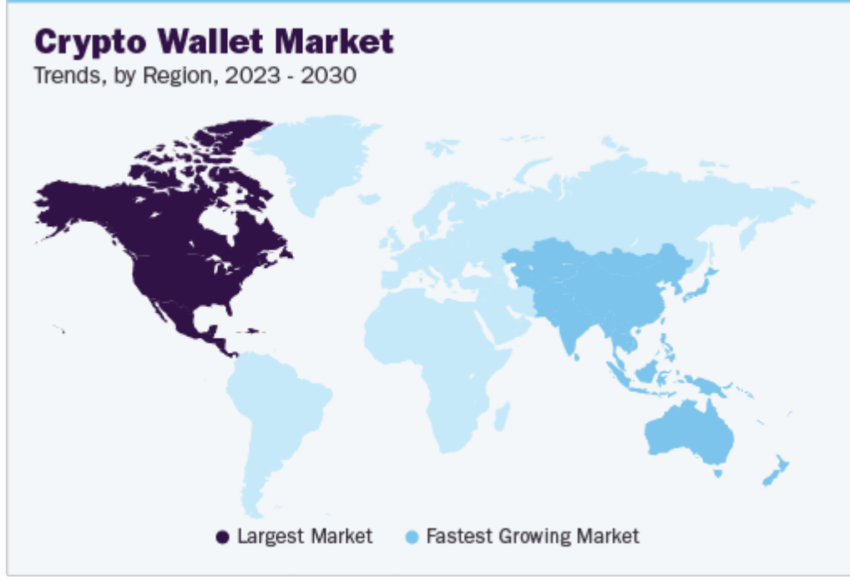Market research firm Technavio predicts crypto wallet use will grow by $686 million by 2026. The growth will depend on the increase in wireless networks, online transactions, and the evolution of regulations.
Technavio estimates the unrest in financial markets during the COVID-19 pandemic boosted the creation of digital wallets. The wallet vendors surveyed include Binance, Exodus, Gemini Trust, Trezor, and Ledger.
Pandemic Boosts Wallet Creation
With a 41% share, North America is the biggest market, followed by China, the UK, Germany, and Switzerland. According to a Technavio study, the size of the e-wallet market, which includes non-crypto digital currencies, is expected to increase by $163.43 billion by 2027.

During the pandemic, US firms Coinbase and Robinhood Markets offered wallets that made it easy to invest in crypto. Other factors contributing to the rise in crypto wallets was the proliferation of play-to-earn games.
Read our in-depth comparison of Robinhood and Coinbase here.
Pandemic restrictions encouraged earning crypto income from playing blockchain-based games like Axie Infinity. As a result, regions like the Philippines saw a dramatic spike in wallet creation as players piled in for a chance to supplement existing income.
Around the same period, the amount Indians invested in cryptocurrencies grew from $923 million to $6.6 billion.
Find out how to safeguard your crypto here.
New Regulations May Temper Wallet Forecasts
But coordinated efforts to regulate crypto could slow adoption. New regulations in Hong Kong and the recently passed Markets in Crypto-Assets (MiCA) bill can complicate the rollout of new wallets that must comply with money-laundering rules.
In April, G20 leaders agreed on the need for a global crypto framework. Earlier this month, India commissioned the Financial Stability Board and the International Monetary Fund to release a paper offering recommendations for a global crypto policy.
Among other things, the paper argues that using digital currency hurts monetary sovereignty and weakens central bank policy. Choosing to hold crypto means that investors are less likely to deposit funds that can contribute to local infrastructure.
As a result, countries it implores countries to act to protect monetary sovereignty.
Europe’s MiCA bill lowers the privacy of crypto transactions by compelling exchanges to report both parties involved in a transaction on its platform. A recent proposal by US lawmaker Jack Reed would impose “know your customer” reporting rules on those who control or have invested significantly in a decentralized protocol.
Got something to say about the Technavio study on crypto wallets or anything else? Write to us or join the discussion on our Telegram channel. You can also catch us on TikTok, Facebook, or X (Twitter).
Disclaimer
In adherence to the Trust Project guidelines, BeInCrypto is committed to unbiased, transparent reporting. This news article aims to provide accurate, timely information. However, readers are advised to verify facts independently and consult with a professional before making any decisions based on this content. Please note that our Terms and Conditions, Privacy Policy, and Disclaimers have been updated.


